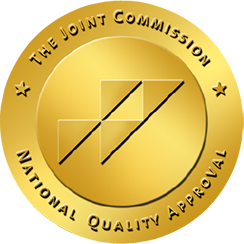
McKinney, Texas, United States
BasePoint Academy McKinney - Teen Mental Health & Counseling
Verified
Verified
This provider’s information has been quality-checked by Recovery.com’s Research Team for accuracy and completeness, including center verification through appropriate third-party organizations.
Joint Commission Accredited
The Joint Commission accreditation is a voluntary, objective process that evaluates and accredits healthcare organizations (like treatment centers) based on performance standards designed to improve quality and safety for patients. To be accredited means the treatment center has been found to meet the Commission's standards for quality and safety in patient care.
Provider's Policy
Contact the center to speak with a licensed therapist for a same day mental health assessment for teens and adolescents. BasePoint accepts insurance for Virtual Treatment and accepts most major private insurance companies. However, the center does not accept Medicaid, Medicare, or state insurance.
Highlights from the Center
Highlights
These highlights are provided by and paid for by the center.
1-on-1 Counseling
Trauma-Informed Care
Adolescents
Spanish and English
About BasePoint Academy McKinney - Teen Mental Health & Counseling
Contact the center to schedule a free mental health assessment for teens and adolescents.
When a teen is struggling, BasePoint Academy in McKinney understands. They're a lifeline for families navigating adolescent mental health challenges. Located conveniently off the highway, their facility is not a typical clinical space, but more a cozy home-like environment filled with compassionate professionals who can help. Whether a young person is battling anxiety, depression, ADHD, or substance challenges, BasePoint Academy offers a judgment-free perspective. Their flexible programs – from partial hospitalization to intensive outpatient – mean treatment adapts to the teen's life, not the other way around. Open seven days a week with transportation provided, they've thought of everything needed to make getting help as smooth as possible.
Build Resilience in the Face of Adversity
At BasePoint Academy, teen mental health care isn't about fixing something "broken" - it's about building resilience. Rather than shielding teens from adversity, they empower teens by equipping them with skills to minimize the impact of suffering. Using evidence-based therapies like cognitive behavioral therapy (CBT) and dialectical behavior therapy (DBT), they're teaching teens how to navigate life's challenges before those challenges become overwhelming. What makes BasePoint different is their belief that resilience is something that can be learned. By working closely with both teens and their families, they create a supportive ecosystem that doesn't just help teens survive their current struggles, but teaches them how to thrive in the future.
Transform Mental Health with Education, Culture, and Accessibility
Through a strategic partnership with the University of Texas Charter School, BasePoint Academy McKinney promotes academic continuity, allowing students to stay on track while receiving treatment. Their commitment to cultural competence creates an inclusive environment that respects diverse backgrounds and religious affiliations. The academy also offers crisis management services, providing immediate stabilization and evidence-based interventions for teens experiencing acute mental health challenges. Recognizing the need for flexibility, BasePoint Academy provides virtual treatment options that make mental health support accessible from anywhere, complemented by their in-person programs.
Find Comfort and Care in a Nurturing Environment
BasePoint Academy in McKinney, Texas, is designed specifically for teens ages 11 to 18. As clients enter the building, warm sunlight streams through large windows, and vibrant colors instantly lift moods, putting clients at ease. Thoughtfully designed therapy rooms invite real introspection, whether for individual or group sessions. Cozy common areas provide a comfortable space for reflection and connection.
Read More

Insurance Accepted
Provider's Policy:Contact the center to speak with a licensed therapist for a same day mental health assessment for teens and adolescents. BasePoint accepts insurance for Virtual Treatment and accepts most major private insurance companies. However, the center does not accept Medicaid, Medicare, or state insurance.
Other Centers From BasePoint
Let Your Story Matter
At BasePoint Academy, cultural competence is a cornerstone in their approach to teen mental health. They recognize that each young person's journey is unique, shaped by their cultural background, beliefs, and experiences. By embracing diversity and tailoring treatment to individual needs, BasePoint creates a safe environment where teens from all walks of life can feel truly seen and understood. Their commitment to cultural competence goes beyond just acceptance; they actively dismantle barriers and so that every teen can thrive.
Strengthen Family Bonds for Lasting Change
At BasePoint Academy, family therapy is a part of their transformative approach to heal entire family systems. By bringing parents, siblings, and teens together in a safe, supportive environment, they create opportunities for deeper understanding and familial healing. Their therapists expertly navigate complex family dynamics, helping families work through challenges like anxiety, depression, communication breakdowns, and relationship conflicts. Whether it's a traditional, blended, or LGBTQ+ family, BasePoint's approach allows every family member to feel heard.
Targeted Therapy for Every Developmental Need
At BasePoint Academy, they understand that a 13-year-old's needs vastly differ from those of an 18-year-old. That's why their programs are thoughtfully tailored to specific age groups: 11-13 and 14-18. For younger teens, they focus on building foundational coping skills and navigating the challenges of early adolescence. Their older teen track addresses more complex issues like identity formation, college preparation, and transitioning to adulthood.
Heal without Interrupting Education
At BasePoint Academy, healing extends far beyond therapy sessions. They recognize that a teen's mental health journey intertwines with every aspect of their life, including academics. Their approach makes certain that students don't fall behind in school while focusing on their mental wellness. Through partnerships with local schools and on-site educational support, teens can continue their studies seamlessly. This integration of academic continuity with mental health treatment helps reduce stress and maintain a sense of normalcy.

Center Overview
Estimated Cash Pay Rate
Adolescents
Teens receive the treatment they need for mental health disorders and addiction, with the added support of educational and vocational services.
Children
Treatment for children incorporates the psychiatric care they need and education, often led by on-site teachers to keep children on track with school.
LGBTQ+
Addiction and mental illnesses in the LGBTQ+ community must be treated with an affirming, safe, and relevant approach, which many centers provide.

Treatment Focus
This center specializes in primary mental health treatment and offers programs for co-occurring substance use. You receive collaborative, individualized treatment for whole-person healing.
Treatment
Specializations
Adolescents
Teens receive the treatment they need for mental health disorders and addiction, with the added support of educational and vocational services.
Anxiety
Anxiety is a common mental health condition that can include excessive worry, panic attacks, physical tension, and increased blood pressure.
Co-Occurring Disorders
A person with multiple mental health diagnoses, such as addiction and depression, has co-occurring disorders also called dual diagnosis.
Depression
Symptoms of depression may include fatigue, a sense of numbness, and loss of interest in activities. This condition can range from mild to severe.
Drug Addiction
Drug addiction is the excessive and repetitive use of substances, despite harmful consequences to a person's life, health, and relationships.
Outpatient
During outpatient rehab, patients attend a structured treatment program while continuing to live at home.
Post Traumatic Stress Disorder
PTSD is a long-term mental health issue caused by a disturbing event or events. Symptoms include anxiety, dissociation, flashbacks, and intrusive thoughts.
Trauma
Some traumatic events are so disturbing that they cause long-term mental health problems. Those ongoing issues can also be referred to as "trauma."
Treatment Services
Day Treatment
In a PHP, patients live at home but follow an intensive schedule of treatment. Most programs require you to be on-site for about 40 hours per week.
Intensive Outpatient Program
In an IOP, patients live at home or a sober living, but attend treatment typically 9-15 hours a week. Most programs include talk therapy, support groups, and other methods.
Licensed Primary Mental Health
Some primary care providers offer mental health diagnosis and treatment. This can prevent patients from developing more serious conditions.
Outpatient
During outpatient rehab, patients attend a structured treatment program while continuing to live at home.
Approaches
Evidence-Based
A combination of scientifically rooted therapies and treatments make up evidence-based care, defined by their measured and proven results.
Experiential
Expressive tools and therapies help patients process past situations, learn more about themselves, and find healing through action.
Holistic
A non-medicinal, wellness-focused approach that aims to align the mind, body, and spirit for deep and lasting healing.
Individual Treatment
Individual care meets the needs of each patient, using personalized treatment to provide them the most relevant care and greatest chance of success.
Therapies
1-on-1 Counseling
Patient and therapist meet 1-on-1 to work through difficult emotions and behavioral challenges in a personal, private setting.
Play Therapy
This approach is commonly used with children. It incorporates elements of play and self-expression, like boardgames, finger painting, dolls, and blocks.
Online Therapy
Patients can connect with a therapist via videochat, messaging, email, or phone. Remote therapy makes treatment more accessible.
Experiential Therapy
With this approach, patients heal by doing. Therapists help patients process difficult emotions to speak, using guided activities like art or dance.
Family Therapy
Family therapy addresses group dynamics within a family system, with a focus on improving communication and interrupting unhealthy relationship patterns.
Mindfulness-Based Cognitive Therapy
MBCT combines mindfulness practices—like meditation—with cognitive therapy techniques to help patients work through negative thought patterns.
Motivational Interviewing and Enhancement Therapy (MET)
This approach is based on idea that motivation to change comes from within. Providers use a conversational framework that may help you commit to recovery.
Relapse Prevention Counseling
Relapse prevention counselors teach patients to recognize the signs of relapse and reduce their risk.
Conditions We Treat
Schizophrenia
Schizophrenia is a serious mental health condition that causes hallucinations, delusions, and disordered thinking.
Grief and Loss
Grief is a natural reaction to loss, but severe grief can interfere with your ability to function. You can get treatment for this condition.
ADHD, ADD
ADHD is a common mental health condition caused by dopamine imbalance. Common symptoms include inattention, hyperactivitiy, and impulsivity.
Anger
Although anger itself isn't a disorder, it can get out of hand. If this feeling interferes with your relationships and daily functioning, treatment can help.
Anxiety
Anxiety is a common mental health condition that can include excessive worry, panic attacks, physical tension, and increased blood pressure.
Bipolar
This mental health condition is characterized by extreme mood swings between depression, mania, and remission.
Burnout
Burnout entails mental and physical exhaustion, and leads to a severe lack of fulfillment. This condition is often caused by overwork.
Depression
Symptoms of depression may include fatigue, a sense of numbness, and loss of interest in activities. This condition can range from mild to severe.
Eating Disorders
An eating disorder is a long-term pattern of unhealthy behavior relating to food. Most people with eating disorders have a distorted self-image.
Obsessive Compulsive Disorder (OCD)
OCD is characterized by intrusive and distressing thoughts that drive repetitive behaviors. This pattern disrupts daily life and relationships.
Substances We Treat
Alcohol
Using alcohol as a coping mechanism, or drinking excessively throughout the week, signals an alcohol use disorder.
Co-Occurring Disorders
A person with multiple mental health diagnoses, such as addiction and depression, has co-occurring disorders also called dual diagnosis.
Drug Addiction
Drug addiction is the excessive and repetitive use of substances, despite harmful consequences to a person's life, health, and relationships.
Aftercare
Experience
Special Considerations
Off-Site Amenities
Smoking and Vaping Policy
Learn more about BasePoint Academy McKinney - Teen Mental Health & Counseling
We love hearing about your treatment experience
Help individuals and families seeking treatment by sharing your first-hand experience with this treatment provider. Review Guidelines.































